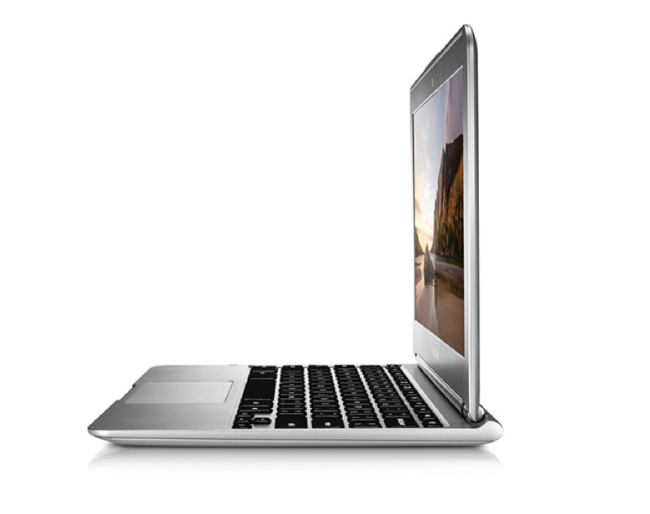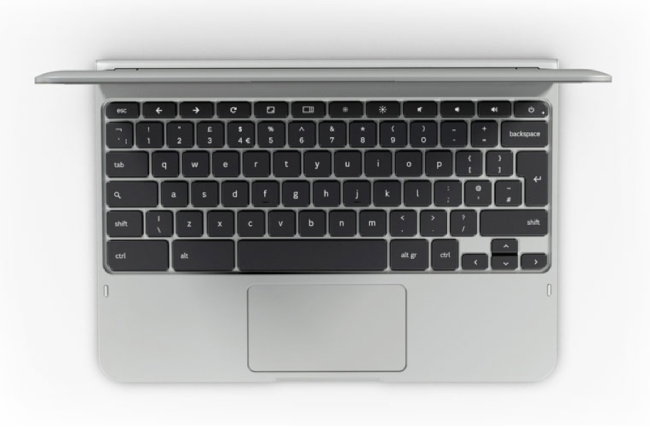The Samsung Chromebook
The first time I saw a Chromebook – that is a notebook that uses Google’s Chrome browser as its operating system – about two years ago I remember being completely stumped. No discernable operating system, just a browser. It felt a little like trying to ride a bicycle without handlebars. Such is our dependency on operating systems.
Now a few days after playing around with the Samsung Chromebook, I get what Google is trying to achieve with the Chrome OS.
If you think about it, most people actually spend most of their digital lives looking at the world through the lens of a browser.
Operating systems were invented primarily to help humans drive computers. But now that the internet is one giant, pulsating computer called cloud, the idea is to leave the management of the cloud’s operating system in the hands of data centre operators and allow people to just get on with their digital lives. They want to follow sports, communicate with friends, be entertained and informed.
The need for simplicity reflects the fact most of the new digital citizens will come online in the coming years via smartphones and low-cost computers from developed and developing countries and from a wider range of age groups.
Apple recognised this need for simplicity with the iPad and Google’s Android operating system has accelerated the spread of affordable smartphones.
But Google’s Chrome OS strategy could be soon credited with accelerating the march of affordable personal computing to the billions of future internet users.

I first got my hands on a Chromebook three years ago at CES and I wasn’t really convinced at the time. I just saw a browser. I didn’t get it.
First impressions
But after almost a week with the Samsung Chromebook, the penny has dropped. Firstly, it became a stark reminder of how many actual Google apps I depend on daily just to go about my tasks, everything from search to Gmail, YouTube, Drive, Analytics, Reader and Google+.
I realised that pretty much 90pc or more of what I do on a daily basis in the course of my work I actually do via a browser window.
The next thing that amazed me was how ‘baked in’ the OS is to the hardware and I get the sense that Google had to work very closely with the hardware manufacturers to get this right.
The Samsung Chromebook is what you’d describe as an affordable personal computer. Costing just €279 for the Wi-Fi version and €379 for the 3G version, it strips away a lot of the expensive clutter you’d find generally in PCs and especially all that annoying advertising software that computer retailers allow to be pushed onto machines and that only serve to slow them down or frustrate their users.
It has a 12.1-inch screen and a delightfully ergonomic keyboard and a very responsive touchpad that allows for natural scrolling. In fact, the whole thing feels loose and comfortable, it’s a little like slipping into a pair of favourite, old boots.
The first thing you need to get used to is that Chromebook reflects your online life and once you put in your Google password you’re off. Like I said, it astonished me how quickly I started opening tabs and connecting to favourite apps from the Google-verse. Accessing non-Google browser apps like Microsoft’s new Outlook was very easy and also works very well on the machine. I also accessed a Chrome-optimised version of Spotify and that worked pretty well, too. Basically anything that requires a browser window works well on the Chromebook.

In terms of hardware, the Samsung Chromebook has two USB ports, an HDMI port and an SD card slot. It comes with 16GB of storage and 2GB of standard system memory.
Powered by an Intel Atom processor, the machine comes with a 1MP HD webcam.
In terms of display, the screen is non-gloss 1,280 x 800 resolution LED, which in a world of Retina displays seems a little faded for my liking. But that’s because we’ve been spoilt in terms of display quality on smartphones as manufacturers compete to come up with the crispest, sharpest display.
Aware of the display race, Google has already taken the wraps off a newer sibling to these first-generation Chromebooks, the touchscreen Chromebook Pixel, which boasts what Google claims is the highest resolution display in the market with 4.3m pixels.
But in fairness the display on the Samsung Chromebook is pretty decent and allows HD 720p playback for video and its stereo speakers emit a pretty good sound, I have to say.
Versatile cloud computing
What I like most about the Samsung Chromebook is its versatility. It weighs just 2.5 pounds and is just 0.8 inches thick. Another plus is the device’s battery. I managed to get about two days out of the device on a single charge and non-continuous use. The computer can work for six hours of continuous use.
Capable of booting up in less than 10 seconds, the machine has a very comfortable feel and because of its lightness and versatility you just want to bring it everywhere with you.
It is not surprising that the Chromebook has been No 1 on Amazon’s best-seller list every day since it launched 150 days ago and that Chromebooks represent more than 10pc of notebook sales at Currys and PC World in the UK.
This really is a simple, elegant and potent device that meets the computing and internet needs of most users.
I can see the Samsung Chromebook doing very well in markets where people just want a versatile device through which they can work and learn and be entertained and where there is little chance of anything going awry. This class of computer could do very well in the educational sphere, where students could possibly be more productive in terms of writing than tablet devices would allow.
It could also work quite well in the business world, where companies can equip workers with low-cost devices and manage the entire workflow through Google Docs.
In its own imitable way, Google has fashioned the ultimate cloud computer.
The Samsung Chromebook is available today from Dixons and Amazon Online and will be in-store at PC World and Currys in Ireland by the end of this month.